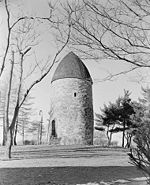Salem Incident
| Powder Alarm | |||||||
|---|---|---|---|---|---|---|---|
| Part of the American Revolutionary War | |||||||
 The Old Powder House in Somerville, Massachusetts, as it stood in 1935, atop the hill at Nathan Tufts Park overlooking Powder House Square |
|||||||
|
|||||||
The Powder Alarm was a major popular reaction to the removal of gunpowder from a magazine by British soldiers under orders from General Thomas Gage, royal governor of the Province of Massachusetts Bay, on September 1, 1774. In response to this action, amid rumors that blood had been shed, alarm spread through the countryside to Connecticut and beyond, and American Patriots sprang into action, fearing that war was at hand. Thousands of militiamen began streaming toward Boston and Cambridge, and mob action forced Loyalists and some government officials to flee to the protection of the British Army.
Although it proved to be a false alarm, the Powder Alarm caused political and military leaders to proceed more carefully in the days ahead, and essentially provided a "dress rehearsal" for the Battles of Lexington and Concord seven and a half months later. Furthermore, actions on both sides to control weaponry, gunpowder, and other military supplies became more contentious, as the British sought to bring military stores more directly under their control, and the Patriot colonists sought to acquire them for their own use.
In 1772, many of the thirteen British colonies, in response to unpopular British actions and the negative British reaction to the Gaspee Affair (the destruction by colonists of a grounded ship involved in enforcing customs regulations), elected to form Committees of Correspondence. These allowed communities to formally communicate with each other, raise awareness of incidents occurring elsewhere, and to coordinate actions; as such, they became instrumental in managing the colonial response to enforcement of the Tea Act, the Intolerable Acts, and other unpopular British colonial legislation. The colonists of Massachusetts had not yet taken concerted action to organize themselves militarily against actions of the British regulars, although statements were made about supporting Boston (whose port had been closed earlier in 1774 under the Boston Port Act) "at the risque of our lives and fortunes."
...
Wikipedia
